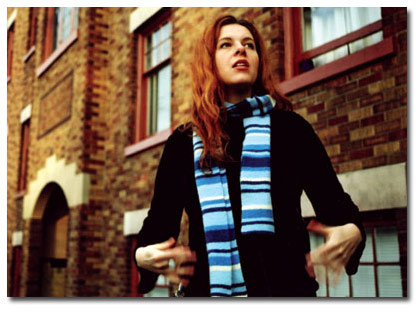Cover Story: Neko Case

In order to reach Neko Case via phone, you have to dial the least-populous time zone in the continental United States. You must reprogram yourself and remember your scheduled 3 p.m. Mountain Standard Time interview means not calling at 2 p.m. Chicago time like it would be when calling New York, or 5 p.m. when calling L.A.-la land. Clearly preparation is key.
Lack of prep means ringing Case when she doesn’t expect you, and introduces her outgoing voicemail message, which hasn’t changed in months:
Hey this is Neko. I am not around. I’m not answering the phone, and I’m not calling anybody back because I can’t. Because I’m working. So if you leave a message, I probably won’t call you back for a month. It doesn’t mean I don’t like you, I’m just not picking up the phone. Thank you for understanding.
Of course, you don’t know this hasn’t changed in months so you fire off a hail of emails to publicists, scared the time-short singer-songwriter has forgotten you and your cover story. Then the sobering news arrives: 3 p.m. Mountain time is 4 p.m. Central: she hasn’t missed your interview like you suggested on the message you left her — and you feel like a big ol’ dumb dumb head.
Luckily, Case is understanding when we finally connect, probably since her whole world behaves irrespective the rules of time. Her latest album, Fox Confessor Brings The Flood (Anti), stakes its tent in modernity, simultaneously nicking characters and themes from Russian fairytales. It’s a tour-de-force of the range she has had on display since her solo debut, 1997’s The Virginian (Bloodshot), carried through the four-year-old Blacklisted.
“As far as Blacklisted goes and as far as this record goes, I haven’t looked back and seen anything I wanted to change,” she says. “The first couple records I made, there’s a lot of things I’m not happy with but I was happy with at the time. But that means you’ve figured a problem out or you’ve grown in some way. And that’s not necessarily a mistake. Some records are experiments; you think nobody will ever hear them. And what you do is, you go into a different direction later. That might be how you deal with it.”
But she not only went in a different direction, she went in directions, plural. If anything (despite whoever first inputted Fox Confessor into the iTunes database), the new record should finally strip the inflexible “alt-country” tag that formerly shadowed Wilco. “That Teenage Feeling” is in sock-hop, 6/8 time, masking regrets “Common as a winter cold”; “Margaret Vs. Pauline” tussles with privilege in a sidelined, Eleni Mandell resignation; and her arrangement of trad standard “John Saw That Number” rumbles from the pulpit with gospel fervor. Like most things, the Russian element is an added texture, no more integral than anything else.
“They’re not based on Russian fables themselves,” she explains, “there’s just a couple characters borrowed. [‘Fox Confessor’] was the song I thought most encapsulated what I thought the record should be about — which is losing your faith — but not so much the Fox Confessor himself. I don’t know how anyone can live in the United States Of America and not be confronted with that feeling everyday. Not necessarily about losing faith in religion, it could be about losing faith in anything. But it’s not just about losing faith, it’s about the fact you can lose as much faith as you think you can lose. It’s weird, it’s almost like this tiny atom of faith left. It’s almost like physics, like you can’t destroy matter. Even if you destroy matter it still becomes something else. I guess it’s about growth.”
She continues, “I tried to be pretty vague and try not adhere to a time or place too much. I’m just scrambling to make things sound like songs; I just let things sort themselves out. I think about timeline more in the structures of the songs.”
A lot has been made about Case’s transient past, how her family moved around until she separated from them in her mid teens. She took up residencies in the American Northwest/Canadian Southwest, and even Chicago for a number of years. Her second album, Furnace Room Lullaby, challenged itself with a pervading theme of America lost, or its gritty underbelly being crushed under the bloated beast, a place she traveled and knew well. It’s the reason why most discussion about Fox Confessor will center on the opening line of “Hold On, Hold On,” “The most tender place in my heart is for strangers.”
— Steve Forstneger
Appearing: 3/31 at Vic Theatre in Chicago.
Read more about Case’s process behind Fox Confessor in the March issue of Illinois Entertainer.












For your “favorites”: http://www.timeanddate.com